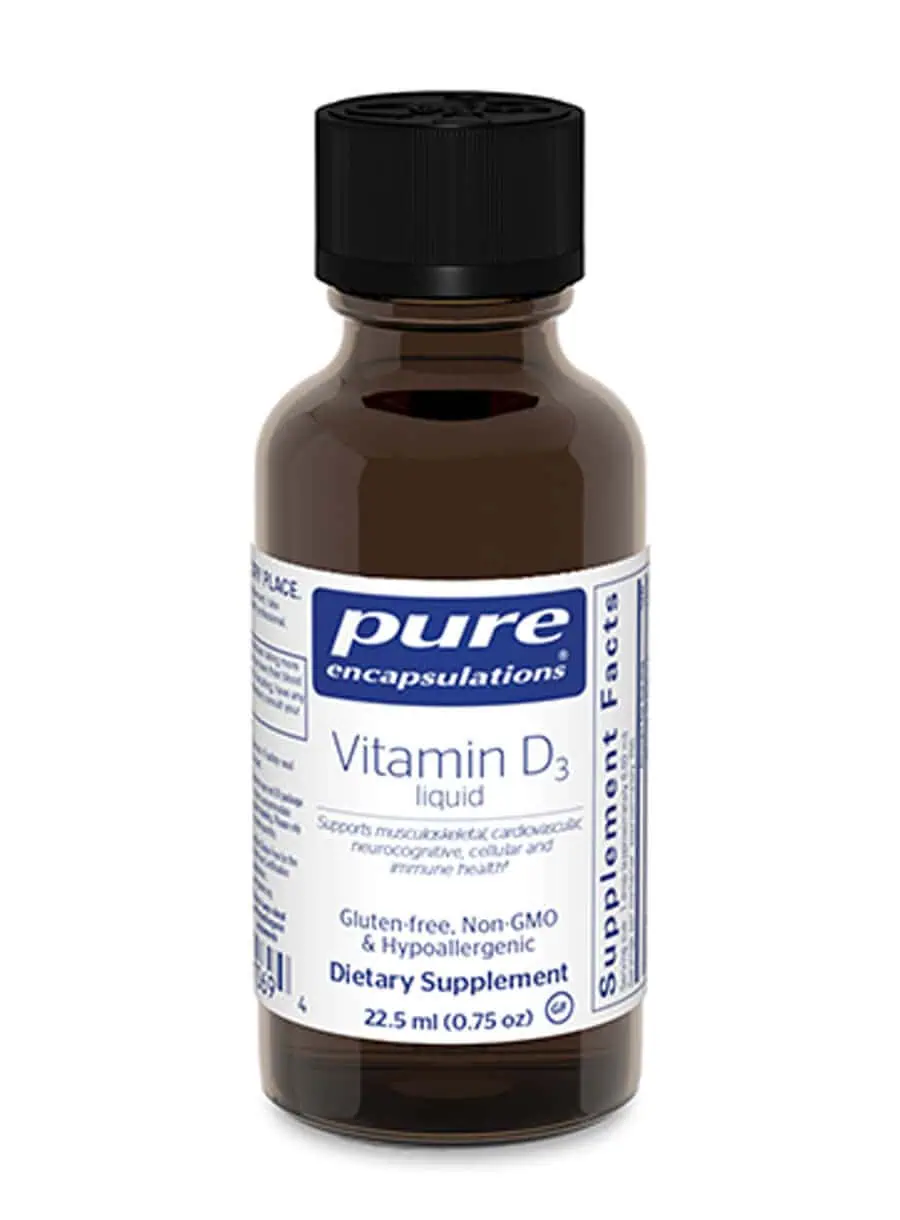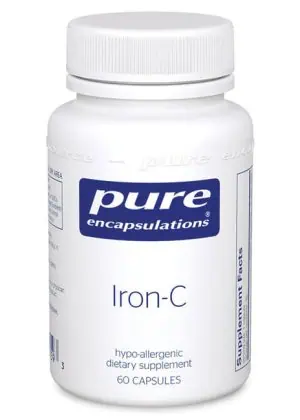Vitamin D3 liquid** Now with no dropper** by Pure Encapsulations
Liquid 22.5 ML
$33.00
$33.00

Suggested Use: 1-7 drops per day, with a meal, or as directed by your health care practitioner.
Not to be taken by pregnant and lactating women. It is recommended that individuals taking more than 2,000 i.u. vitamin D per day have their blood levels monitored.
WARNING: Accidental overdose of liquid vitamin D products can lead to serious adverse side effects in infants. This product is not intended for infants. The recommended daily dose of vitamin D for infants is 400 i.u. per day. This product provides 1,000 i.u. per drop.
What Is It?
Vitamin D3 enhances calcium absorption and retention, a key nutritional role in supporting healthy bones, and may play a potential role in cardiovascular, colon and cellular health. Vitamin D levels have been shown to decline with age, due primarily to a reduction in either absorption or metabolism by the liver. Decreased exposure to sunlight, a vegetarian diet, or a low intake of vitamin D fortified foods also play a role in inadequate vitamin D levels.
Uses For Vitamin D3
Bone Health: Vitamin D promotes intestinal calcium and phosphorous absorption and reduces urinary calcium loss, essential mechanisms for maintaining proper calcium levels in the body and for healthy bone composition. Clinical studies involving vitamin D supplementation suggest the importance of vitamin D in addition to calcium for bone health. Vitamin D supplementation alone may also support bone health. Cardiovascular Support: Vitamin D may also provide cardiovascular support for some individuals, which may be attributed to its effect on calcium metabolism or possibly by helping to maintain healthy plasma renin function.
Cellular Health: Studies suggest vitamin D supports colon health by promoting healthy cellular function. Vitamin D is also believed to provide general cellular support potential, including breast and prostate cells, in part by helping to maintain healthy angiogenesis balance, supporting immune cell activity and maintaining healthy cell metabolism. Preliminary evidence suggests that vitamin D may also play a role in maintaining healthy glucose metabolism, since vitamin D receptors are present on the islet cells of the pancreas.
What Is The Source?
Vitamin D3 is derived from the cholesterol in lanolin, the fat found in wool. Hypo-allergenic plant fiber is derived from pine cellulose. Medium chain triglycerides (Vitamin D3 liquid only) are derived from coconut and palm oil.
Recommendations
Pure Encapsulations provides vitamin D3 capsules in 4 amounts (400 i.u., 1,000 i.u., 5,000 i.u. and 10,000 i.u.) and vitamin D3 liquid. Recommendations are as follows: Vitamin D3 400 i.u. = 1-2 capsules per day, in divided doses, with meals. Vitamin D3 1,000 i.u. = 1-5 capsules per day, in divided doses, with meals. Vitamin D3 5,000 i.u. = 1 capsule per day, with a meal. Vitamin D3 10,000 i.u. = 1 capsule per day, with a meal. Vitamin D3 liquid = 1 or more drops daily, with a meal.
Are There Any Potential Side Effects Or Precautions?
It is recommended that individuals using more than 2,000 i.u. vitamin D per day have their blood levels monitored. Large doses of vitamin D can cause hypercalcemia, signs include headache, weakness, nausea, vomiting, and constipation. Individuals with hyperparathyroidism or kidney disease are at particular risk. Vitamin D3 10,000 i.u., Vitamin D3 5,000 i.u. and vitamin D3 1,000 i.u. are not to be taken by pregnant or lactating women. If pregnant or lactating, consult your physician before taking vitamin D3 400 i.u.
Are There Any Potential Drug Interactions?
Vitamin D may result in hypercalcemia in certain individuals taking digoxin or thiazide
Product Ingredients
- CAUTION: Accidental overdose of liquid vitamin D products can lead to serious adverse side effects in infants. THIS PRODUCT IS NOT INTENDED FOR INFANTS. The recommended daily dose of vitamin D for infants is 10 mcg (400 IU). This product delivers 25 mcg (1,000 IU) of vitamin D per dose.
| Ingredients | AMT | %DV |
|---|---|---|
| vitamin D (as cholecalciferol)(D3) | 25 mcg (1,000 IU) | - |
Why Buy From Us?As a trusted family- and employee-owned company for over 25 years, we've shipped more than 1 million packages, empowering our customers with expert knowledge, guiding their wellness journeys, while delivering unparalleled customer service.

Welcome to Pure Prescriptions
I founded Pure Prescriptions after overcoming Cancer at age 29, a battle that taught me the power of natural supplements and inspired me to make professional-grade, doctor-only brands accessible online—pioneering the industry over 25 years ago.
Today, still a family- and employee-owned company, we've shipped over 1 million packages, empowering countless wellness journeys with science-backed, U.S.-manufactured vitamins and supplements meticulously curated for superior quality and optimal results. Our real health experts provide personalized recommendations without upsells or gimmicks—just genuine support tailored to your needs.
Not a customer yet? We'd be thrilled to earn your trust and guide you toward vibrant health.
Sincerely,
Helpful Links:
Contact Us | LIVE Chat | Vitamin Quiz
The Pure Prescriptions Difference
When you choose Pure Prescriptions, you become part of our caring community. We’re committed to enhancing your wellness with personalized service, expertly selected products, and a dedication to your health & happiness.


Related products
Get Notified When Back In Stock
Verify you are Human:
-
- Vitamin Quiz
- Deals
- Shop
- Brands
- Shop by Manufacturer Brand
- Shop by Manufacturer Brand
- About
- Login





















